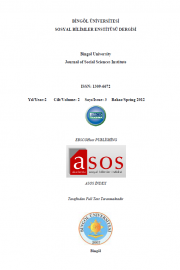WASHING DIRTY LINEN IN PUBLIC - SPANISH FASHION IN THE DISCURSIVE FIELD
WASHING DIRTY LINEN IN PUBLIC - SPANISH FASHION IN THE DISCURSIVE FIELD
Author(s): Ewa WYLÇZEKSubject(s): Cultural history, Social history, Evaluation research, Politics and Identity
Published by: Bingöl Üniversitesi Sosyal Bilimler Enstitüsü
Keywords: Spain; Identity; Fashion; Fashion Campaigns; Ideology;
Summary/Abstract: In this paper, I would like to attempt to explore and comment upon the characteristics of the notions of identity and fashion and the correlation between the two. I will focus on the Spanish fashion represented by companies such as Desigual or Casa de Diego and apply, in the course of the analysis, concepts introduced by Judith Butler, Louis Althusser andMichel Foucault. My presentation is divided into three main parts; Firstly, I would like to justify the choice of paper’s topic i.e., seemingly trivial, fashion. In order to do so, I will address the concept of performativity, as understood in Butler ’s terms, and connect it to the clothes that are inextricably linked with one’s position, beliefs, and worldview. Then, I would like to briefly discuss the Spanish politics towards fashion industry, including Textile Plans and Clothing Industry politics aiming to convey a unifıed image of Spanish fashion to the external, foreign view. In the second part of this paper, I wish to present and examine the phenomenon of fashion in the contemporary display created by Spanish brands and recognize whether the principles and the visual representations they provide differ from the ones decades earlier. Furthermore, I shall incorporate the observation drawn from the analyzed parts and compare them hoping to delineate a parallel between the “fashionable politics” and their material equivalents present in everyday life. I shall employ the Althusserian notions of Ideological State Apparatuses as well as the Repressive State Apparatus in order to explain the mechanism of the feedback and their role in granting one ’s identity. This process will provide a validation for the theme touched upon and show that fashion is a significant andfrequently underestimated aspect of ideology and is worth an attentive academic look.
Journal: Bingöl Üniversitesi Sosyal Bilimler Enstitüsü Dergisi (BUSBED)
- Issue Year: 2/2012
- Issue No: 3
- Page Range: 67-70
- Page Count: 4
- Language: English

